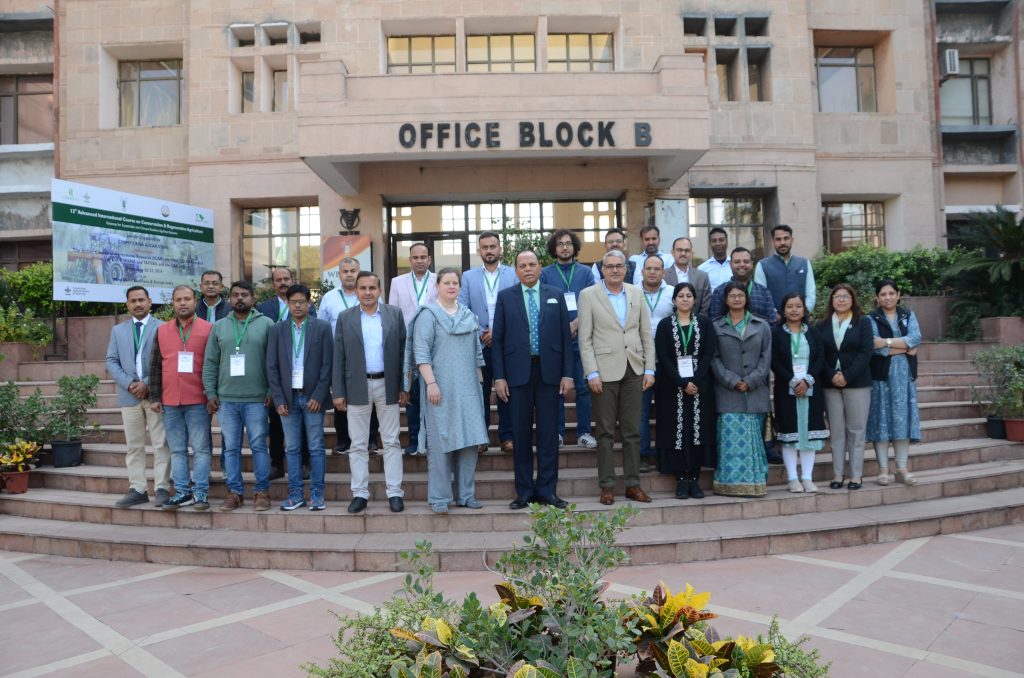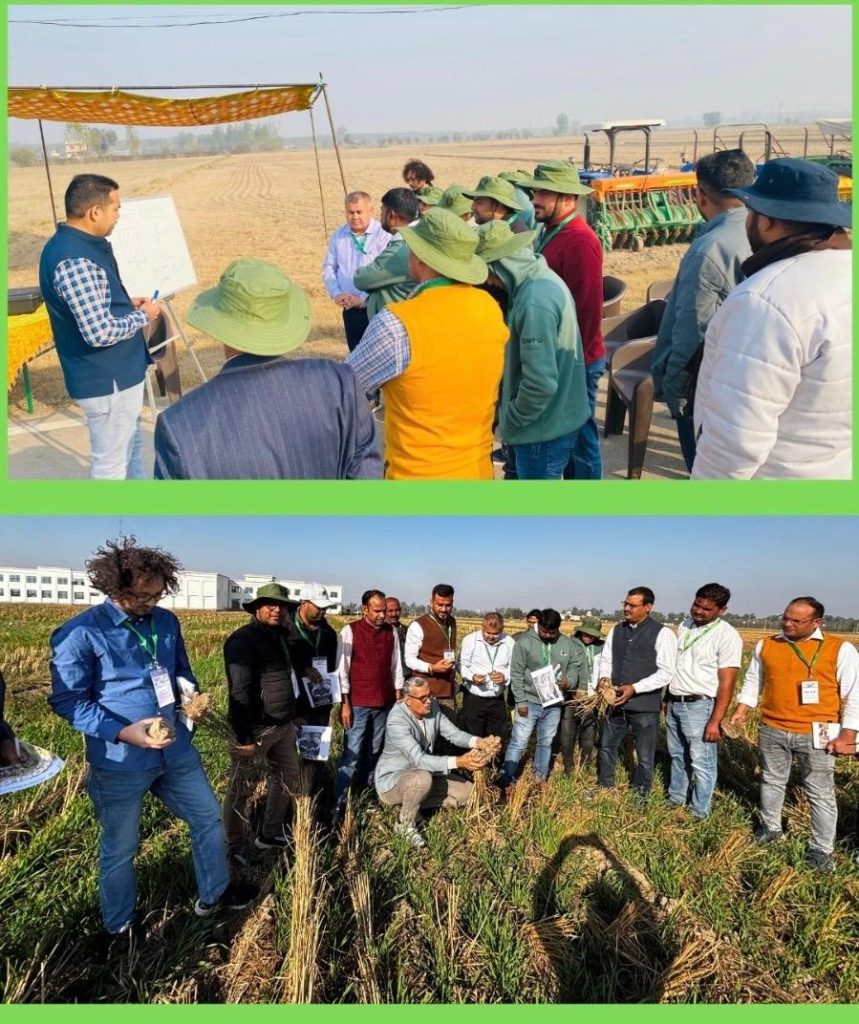Advanced Training in Conservation Agriculture: Fostering Sustainable Agronomic Systems
BY
Alison Laing, Mahesh Gathala and Richa Sharma Puri

CIMMYT, BISA, and ICAR conducted an international three-week training course on Conservation Agriculture (CA) and Regenerative Agriculture (RA), focusing on its potential as a sustainable farming method and a vital tool for managing agrifood system risks in both irrigated and rainfed systems. The program aimed to demonstrate how farmers and scientists can use CA/RA to tackle agrifood challenges effectively.
The training, conducted jointly by CIMMYT, the Borlaug Institute for South Asia (BISA), and the Indian Council of Agricultural Research (ICAR), took place from December 3 to December 23, 2024, at the ICAR-Indian Institute of Maize Research and BISA in Ludhiana (Punjab), ICAR-Central Soil Salinity Research Institute in Karnal (Haryana), and ICAR-Indian Institute of Farming Systems Research in Meerut (Uttar Pradesh), India.
Building Resilient Agrifood Systems
Conservation Agriculture and Regenerative Agriculture (RA), is an approach to cultivated-land management that focuses on ecosystems, based on three main principles: minimal soil disturbance, continuous soil cover, and crop diversification. These methods can greatly improve yields, restore natural resources, lower farming costs, and help develop resilient agricultural systems that safeguard the environment, strengthen production systems’ resilience to climate change, and improve rural livelihoods, particularly in the Global South. In South Asia rural communities depend largely on natural resources for their survival. However, they face significant challenges, such as soil fertility loss, water scarcity, environmental pollution, and the adverse effects of climate change. These challenges put immense pressure on agricultural systems, particularly in both irrigated and dryland farming areas. Despite its advantages, widespread adoption of CA is hindered by barriers such as lack of knowledge of how to implement CA practices in different agro-ecologies, access to appropriate tools, policy support, and the awareness that CA practices offer long-term benefits. Therefore, training and capacity development are essential for scaling CA technologies among smallholder farmers.
The Advanced Course on CA/RA in Asia was started by CIMMYT in partnership with ICAR in 2010 to address all the above challenges. Since then, annual advanced-knowledge workshops have been organised, this being the 13th. This advanced CA training course links cutting-edge scientific research and multidisciplinary strategies, enhancing participants’ skills in sustainable intensification, production system diversification, resilience building, and natural resource conservation. Over 220 researchers, policymakers, and development personnel from 20 countries have benefited from the CA training program to date.
The 13th edition in India welcomed mid-career researchers from Uzbekistan, Morocco and India. The course was coordinated by Dr. Mahesh Gathala, Cropping Systems Agronomist, and Dr. Alison Laing, Agroecology Specialist, both from CIMMYT, Dr Madhu Choudhary, Senior Scientist at ICAR-CSSRI, and Dr Raj Kumar Jat, Senior Scientist at BISA.
Key Highlights of the Advanced CA Training Course
The advanced course was inaugurated on December 4, 2024, at the NASC Complex in New Delhi, with an address by Dr. S.K. Chaudhari, Deputy Director General for Natural Resource Management at ICAR, who underscored the importance of CA in addressing climate challenges and managing agronomic risks. Dr. Chaudhari emphasized CIMMYT’s leading role in the dissemination of Conservation Agriculture in India and shared his thoughts on the training program. He said, “I have been observing this course for many years. A lot of young scientists have benefited from this course.” He fondly recalled the inaugural training session held 13 years ago and extended his best wishes to all the participants. Watch his complete statement here.
During the course, participants explored a wide range of CA topics, including conservation and regenerative agriculture across different agroecologies, the emerging role of drones, carbon credits, soil fertility, testing, nutrient management and crop modelling to inform policymakers. Various experts from different scientific fields shared valuable insights into cutting-edge research on irrigated and dryland systems. Participants also had the opportunity to gain practical experience at BISA’s research station in Ludhiana, where hands-on training sessions were led by the expert guidance of Dr HS Sidhu and Dr Manpreet Singh (both Punjab Agricultural University) with the able assistance of Dr Pardeep Sangwal (BISA).
The training also included field visits to ICAR-CSSRI in Karnal, where the Director Dr. R.K. Yadav, Madhu Chaudhary and Dr. Kailash Prajapat highlighted the Institute’s long-term CA experiments, practical demonstration on soil biology and their role in generating evidence to guide policy decisions. Dr. Gathala also led hands-on training in critical soil physical & chemical analytical techniques at joint ICAR- CIMMYT field trial sites in Karnal. Special visits were arranged to innovative farm machinery manufacturers, including Landforce and National Agroindustry, where participants witnessed advanced manufacturing techniques and gained insights into the latest farming equipment. In addition, participants also had the opportunity to visit and interact with the manufacturing association at the platform of the 5th India International Agri Expo at Ludhiana.
Participants also participated in a village visit outside Karnal, where they engaged with farmers who shared their experiences of implementing CA practices on their fields. This practical exchange allowed participants to observe firsthand the real-world impact of CA on farming communities.
Cultural Immersion: Visits to the Golden Temple and Wagah Border
A cultural extravaganza was organized for the participants, giving them a chance to experience a taste of the rich cultural heritage of India. They visited the Golden Temple in Amritsar, where they witnessed the spiritual atmosphere and profound cultural significance of the site. Additionally, the group travelled to the Wagah Border, where they observed the iconic flag-lowering ceremony, symbolizing the enduring spirit of cooperation and patriotism between India and Pakistan. These cultural excursions provided participants with a deeper understanding of India’s traditions and history.
The program concluded with a ceremony at ICAR-CSSRI in Karnal, where Dr. R.K. Yadav, Rajbir Singh (ADG-ICAR), Dr. Raj K Gupta, Ex-CIMMYT Country Representative, and Dr. H.S. Jat (Director, ICAR-IIMR) addressed the participants, followed by reflections on the advanced training course from participants. Key feedback highlighted innovative aspects of the training, including hands-on practical demonstrations of CA machinery and drones, as well as an understanding of emerging carbon credit systems, and the opportunity to exchange ideas with fellow researchers from Morocco, Uzbekistan and different agro-ecologies across India, all of which greatly enhanced participants’ confidence and technical expertise in CA practices.
The success of this program underscores the critical need for ongoing collaboration and training to promote sustainable agricultural practices. These efforts are essential in strengthening food security and enhancing climate resilience across the Global South.




